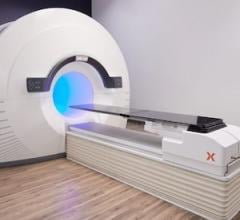June 10, 2014 — Advanced cancer of the neuroendocrine system can lead to dismal prognoses, but a novel therapy is packing a punch by uniting powerful radionuclide treatment and chemotherapy drugs, revealed researchers at the Society of Nuclear Medicine and Molecular Imaging’s 2014 Annual Meeting.
The research findings show that the experimental therapy led to stabilization or regression of patients’ cancer in about 70 percent of cases a year after completion of the treatment, now called peptide receptor chemo-radionuclide therapy (PRCRT). The therapy is just catching on across Europe and Australia and now in U.S. clinical trials.
“Results of this study suggest that PRCRT is a highly effective treatment option for patients with progressive NETs with high somatostatin receptor expression,” explained Grace Kong, MBBS, principal investigator for this study conducted at the Centre for Cancer Imaging, Peter MacCallum Cancer Centre in Melbourne, Australia.
Neuroendocrine tumors (NETs) are those that develop within a multiplicity of organs throughout the body that have nerve cells and interact with the endocrine system through chemical signaling made possible with various hormones. These tumors usually develop along the intestines and lungs, but they can also be found in the pancreas and many other sites, although rarely. For this study, researchers observed patients who had undergone at least three courses of treatment with Lutetium-177 DOTA-Octreotate, which is prescribed for inoperable patients with NETs expressing somatostatin hormone receptors. This study included a high proportion of grade two disease, which is more aggressive and associated with adverse prognosis. Researchers added a radio-sensitizing chemotherapy for 63 out of the 68 patients in the study.
All of these steps together produced encouraging responses in a majority of subjects, with 72 percent survival at two years. More than half of patients were still alive past the five-year mark after therapy.
“The high objective response and long median survival even in patients with more aggressive tumor biology warrant further studies comparing it with other targeted therapies recently approved, despite much lower response rates,” Kong added.
For more information: www.snmmi.org


 January 30, 2026
January 30, 2026 









